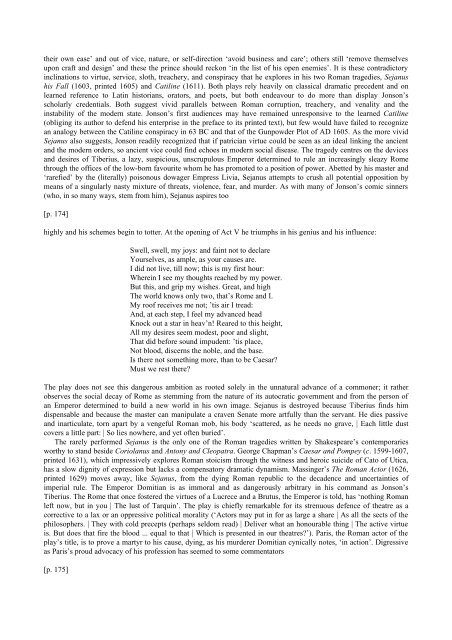THE SHORT OXFORD HISTORY OF ENGLISH LITERATURE
THE SHORT OXFORD HISTORY OF ENGLISH LITERATURE
THE SHORT OXFORD HISTORY OF ENGLISH LITERATURE
You also want an ePaper? Increase the reach of your titles
YUMPU automatically turns print PDFs into web optimized ePapers that Google loves.
their own ease’ and out of vice, nature, or self-direction ‘avoid business and care’; others still ‘remove themselves<br />
upon craft and design’ and these the prince should reckon ‘in the list of his open enemies’. It is these contradictory<br />
inclinations to virtue, service, sloth, treachery, and conspiracy that he explores in his two Roman tragedies, Sejanus<br />
his Fall (1603, printed 1605) and Catiline (1611). Both plays rely heavily on classical dramatic precedent and on<br />
learned reference to Latin historians, orators, and poets, but both endeavour to do more than display Jonson’s<br />
scholarly credentials. Both suggest vivid parallels between Roman corruption, treachery, and venality and the<br />
instability of the modern state. Jonson’s first audiences may have remained unresponsive to the learned Catiline<br />
(obliging its author to defend his enterprise in the preface to its printed text), but few would have failed to recognize<br />
an analogy between the Catiline conspiracy in 63 BC and that of the Gunpowder Plot of AD 1605. As the more vivid<br />
Sejanus also suggests, Jonson readily recognized that if patrician virtue could be seen as an ideal linking the ancient<br />
and the modern orders, so ancient vice could find echoes in modern social disease. The tragedy centres on the devices<br />
and desires of Tiberius, a lazy, suspicious, unscrupulous Emperor determined to rule an increasingly sleazy Rome<br />
through the offices of the low-born favourite whom he has promoted to a position of power. Abetted by his master and<br />
‘rarefied’ by the (literally) poisonous dowager Empress Livia, Sejanus attempts to crush all potential opposition by<br />
means of a singularly nasty mixture of threats, violence, fear, and murder. As with many of Jonson’s comic sinners<br />
(who, in so many ways, stem from him), Sejanus aspires too<br />
[p. 174]<br />
highly and his schemes begin to totter. At the opening of Act V he triumphs in his genius and his influence:<br />
Swell, swell, my joys: and faint not to declare<br />
Yourselves, as ample, as your causes are.<br />
I did not live, till now; this is my first hour:<br />
Wherein I see my thoughts reached by my power.<br />
But this, and grip my wishes. Great, and high<br />
The world knows only two, that’s Rome and I.<br />
My roof receives me not; ’tis air I tread:<br />
And, at each step, I feel my advanced head<br />
Knock out a star in heav’n! Reared to this height,<br />
All my desires seem modest, poor and slight,<br />
That did before sound impudent: ’tis place,<br />
Not blood, discerns the noble, and the base.<br />
Is there not something more, than to be Caesar?<br />
Must we rest there?<br />
The play does not see this dangerous ambition as rooted solely in the unnatural advance of a commoner; it rather<br />
observes the social decay of Rome as stemming from the nature of its autocratic government and from the person of<br />
an Emperor determined to build a new world in his own image. Sejanus is destroyed because Tiberius finds him<br />
dispensable and because the master can manipulate a craven Senate more artfully than the servant. He dies passive<br />
and inarticulate, torn apart by a vengeful Roman mob, his body ‘scattered, as he needs no grave, | Each little dust<br />
covers a little part: | So lies nowhere, and yet often buried’.<br />
The rarely performed Sejanus is the only one of the Roman tragedies written by Shakespeare’s contemporaries<br />
worthy to stand beside Coriolanus and Antony and Cleopatra. George Chapman’s Caesar and Pompey (c. 1599-1607,<br />
printed 1631), which impressively explores Roman stoicism through the witness and heroic suicide of Cato of Utica,<br />
has a slow dignity of expression but lacks a compensatory dramatic dynamism. Massinger’s The Roman Actor (1626,<br />
printed 1629) moves away, like Sejanus, from the dying Roman republic to the decadence and uncertainties of<br />
imperial rule. The Emperor Domitian is as immoral and as dangerously arbitrary in his command as Jonson’s<br />
Tiberius. The Rome that once fostered the virtues of a Lucrece and a Brutus, the Emperor is told, has ‘nothing Roman<br />
left now, but in you | The lust of Tarquin’. The play is chiefly remarkable for its strenuous defence of theatre as a<br />
corrective to a lax or an oppressive political morality (‘Actors may put in for as large a share | As all the sects of the<br />
philosophers. | They with cold precepts (perhaps seldom read) | Deliver what an honourable thing | The active virtue<br />
is. But does that fire the blood ... equal to that | Which is presented in our theatres?’). Paris, the Roman actor of the<br />
play’s title, is to prove a martyr to his cause, dying, as his murderer Domitian cynically notes, ‘in action’. Digressive<br />
as Paris’s proud advocacy of his profession has seemed to some commentators<br />
[p. 175]









